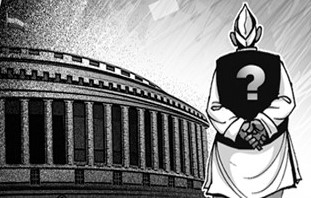With several state elections due soon and the Lok Sabha election due in 2024, many citizen groups are perturbed about the massive money power and the criminal muscle power destroying the very integrity of India’s elections and are trying to build a citizens’ movement to overcome them. A gathering under the banner of the “Karnataka Convention on Electoral Democracy”, was held on October 29, 2022, to awaken citizens to the impending dangers to our democracy as a prelude to the Assembly elections in Karnataka in 2023. The group is being led by leading civil society organisations (CSOs): the Constitutional Conduct Group (CCG), Jan Sarokar, the National Alliance of People’s Movements (NAPM), People First, and Election Watch (Karnataka). They recognise that the 3Ms (Machine, Money, Media) are the main challenges faced by India’s electoral democracy, and political parties were invited to respond to them during the Convention. Stalwart civil society leaders such as M G Devasahayam, Nikhil Dey, Medha Patkar, Thomas Franco, and Anjali Bharadwaj are leading the movement.
The group’s feeling is that “the right to vote is being taken away from the citizen and given to the EVM machine.” Following the 2019Parliamentary election, several CSOs highlighted discrepancies in 347 seats between the number of votes cast and the number of votes counted, raising concerns that millions of votes were missed or miscounted. In six seats, the discrepancy in votes was higher than the winning margin. But no clarification was received from the ECI, and the matter is now pending in the Supreme Court in a PIL. Hence, the public demand to “count every vote and make every vote count.”
With the introduction of the Voter Verifiable Paper Audit Trail (VVPAT) in all EVMs, there are now two votes: one recorded in the EVM memory and one printed by the VVPAT. Rule 56D(4)(b) of the Conduct of Election (Amendment) Rules, 2013, says that, in case of a dispute, the VVPAT slip will be the real vote as per Section 61A of the Representation of People Act, 1951, and not the electronic memory in the EVM. Despite this rule, critics point out that ECI has been refusing to count 100% of VVPAT slips and keeps on counting only the EVM memory, which is not the real vote. They allege that ECI is defending its action and has filed a false affidavit in the Supreme Court.
The group recognises that purely EVM-based voting and counting does not comply with ‘Democracy Principles’ which require that each voter be able to verify that his or her vote is “cast as intended, recorded as cast, and counted as recorded.” A panel of national and international experts testified before the Citizens Commission on Elections (CCE), which is chaired by former Supreme Court Justice Madan B Lokur. Experts sought clarification on seventeen critical points on EVM voting and counting. Still, there has been no acknowledgement, let alone any response, from the ECI.
The group is therefore making the following recommendations: EVMs cannot be assumed to be tamper-proof. A voter should be able to approve a VVPAT printout before the vote is finally cast. The security of the VVPAT slips and the EVM machines after polling and before counting and auditing must be ensured in a verifiable manner. The audit should be based on manual counting of all the VVPAT slips to improve voter confidence.
Money Power
The problem of free and fair elections would not be solved merely by counting the VVPATs instead of the EVMs. The group feels that the “fast-rising economic oligarchy in the country, threatening India as a welfare state, is the direct fallout of this extreme criminal and money power in elections, which is the fountainhead of all corruption in the country.” It compromises the integrity of democracy in multiple ways: it creates barriers for ordinary citizens to enter politics; excludes honest candidates and parties; leads to corruption and big money controlling the policy-making power of the state, leading to “wasteful, inefficient, and anti-democratic directions and exacerbation of polarisation.”
The government, using the Money Bill route to bypass Rajya Sabha, introduced electoral bonds, which have increased the opaqueness of elections and the role of big money in electoral politics. Corporate loans are being wiped off in return for corporate funding of the party in power. As is evident in the happenings in several states, money is being used to alter the electoral mandate given by people by engineering resignations and defections of MLAs. As a result, the group demands that the Electoral Bonds Scheme be terminated in its current form immediately. Details of donations to political parties, including amounts and names of donors, should be in the public domain.
Media Misuse
The group accuses ECI of not taking action on the many media violations in the past elections, despite several guidelines and codes. ECI failed to curb fake news online; procrastination, silence, and inaction characterised ECI’s responses, even to serious violations of the Model Code of Conduct and media code.
The aim of the group’s campaign is to involve civil society groups in Karnataka before the elections to create voter awareness on the dangers being faced by the nation’s democracy through the 3Ms of machine, money, and media; check the accuracy of electoral rolls; prepare citizens’ manifestos that make the above demands on political parties; enhance people’s ability to vote in an informed way by disseminating information about candidates’ backgrounds; understand the ways in which social and other media are creating polarisation through hate-filled texts, posts, and tweets; and demand that the ECI take swift and exemplary action against offenders; such efforts will be the only way to ensure free and fair elections and stem the steep anti-democratic slide the country is currently undergoing.
(The writer of this article, Kathyayini Chamaraj, is the State Coordinator of Karnataka Election Watch (ADR) and an Executive Trustee of CIVIC-Bangalore.)
This article was originally published in Deccan Herald.
